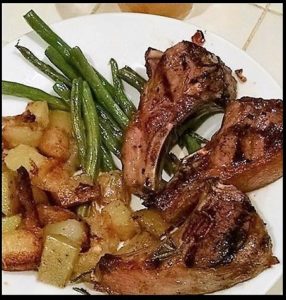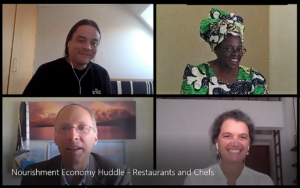Among leading social entrepreneurs, one Nourishment Economy pattern we see is restaurants and chefs triggering a cycle of social, economic and environmental benefits in surrounding communities, often at substantial scale.
Some of our affiliates, for example, source ingredients from tens of thousands of small farmers, while others work with communities to harvest nati ve and wild foods as ingredients. They train and support these local ingredient suppliers, driving economic development both up and down the food system, and also — depending on local circumstances — spreading nutrition, food security, rural-urban cultural connections, and ecological resilience in terms of soils, pollinators, and other types of biodiversity.
ve and wild foods as ingredients. They train and support these local ingredient suppliers, driving economic development both up and down the food system, and also — depending on local circumstances — spreading nutrition, food security, rural-urban cultural connections, and ecological resilience in terms of soils, pollinators, and other types of biodiversity.
This video, transcript, and notes summarize an April 2017 “Huddle” between four accomplished social entrepreneurs on this topic:
– Sylvia Banda, Sylva Food Solutions, Lusaka, Zambia
– Marta Echavarría, Cumari: Rainforest to Table, Quito, Ecuador
– Sean Sherman, the Sioux Chef, Minnesota, USA
– David Strelneck, Nourishn (facilitator)
View the video (YouTube) Download the transcript (pdf)
Some Insights from the Huddle
The discussion reveals a powerful alignment, which indigenous or traditional food enterprises can seize at substantial scale, between taste, nutrition, farming or harvesting techniques, and vitality in the natural environment.
Underlying all of this is substantial economic demand for truly great food –– with all of its social, cultural, epicurean, and health qualities. When discussing business strategies we anticipated a focus on market appeal and consumer-side actions, but it turns out most of the entrepreneurial attention and drivers of success are on the supply side.
Critically important for developing these enterprises and stimulating nourishing- or regenerative economies, it seems, is disciplined focus on the type and source of ingredients, sometimes at a hyper-local level. And, a tremendous source of information about traditional ingredients and tastes is local recipes collected from the citizens themselves. Sylvia Banda points out that provide vital culinary information and vest local constituents. They can also be repurposed in other materials, such as her traditional Zambian foods cookbook, to foster additional demand and impact!
Sean Sherman also highlights that, with disciplined focus on native ingredients by the restaurant, the consumer’s food experience — including the tastes in a meal — becomes powerful for triggering public interest and education about the ecology and human history in a region.
The ingredients in your food, exhibited through taste and other senses, tell a compelling story!
Furthermore, we see in this Huddle and beyond, that these enterprises can become major drivers not only of economic development reaching into rural communities and farming, but also of improved nutrition among communities supplying the products, of social development and local entrepreneurship as those communities develop a sense of expertise and a sense of agency rooted in appreciation and economic demand for their products, and of stewardship of biodiversity in the natural environment with resulting gains for wildlife, watersheds and carbon sequestration.
As illustrated clearly by all three nourishment-entrepreneurs in this Huddle, they also signal great potential for weaving mutually-appreciative relationships between urban and rural populations, with wider implications for the culture, economics and politics in a region.
View the video (YouTube) or download the transcript (pdf) now.
Background
This is part of a 2017 series bringing together social entrepreneurs whose insights and innovations build on cyclical relationships between biological, economic and cultural forces in society: what we call Nourishment Economies.
These Huddles are intended to help push further on insights, challenges, and opportunities, for the participating social entrepreneurs, for people in other communities who will consider launching such an enterprise themselves, and for funders/investors and policymakers who seek to help spread this positive force in the world.
This Nourishment Economy series is co-hosted with Ashoka. This Huddle on Restaurants and Chefs was sponsored by The Christensen Fund.
Please add your observations, insights, questions, and examples of how you use this information in the Comments section below, or email to huddles@nourishn.com.


Additional examples to consider:
– Chef Michel Nischan, Wholesome Wave, USA – http://www.wholesomewave.org
– Chef Teresa Corção, O Navigador & Instituto Maniva, Brazil – http://www.onavegador.com.br
– Kirsten Saenz Toby and Kristin Groos, Revolution Foods, USA – http://revolutionfoods.com
The Perennial, USA – http://www.theperennialsf.com/